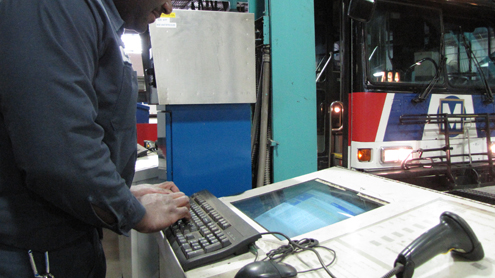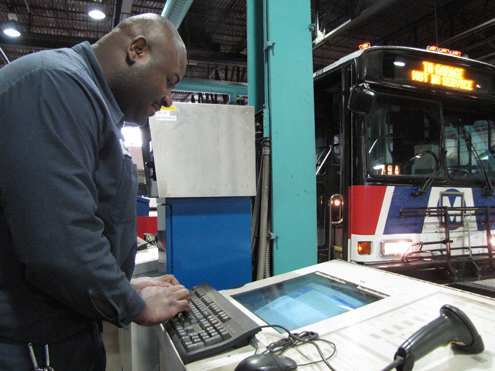

A transit data exchange program would pay it forward
By Jared Schnader
Over the last 20 years, the American transportation industry has seen steady growth in new public transit systems, which is a $55 billion industry, according to the American Public Transit Association (APTA). With industry trends seemingly pointing in a positive direction, APTA says we could reasonably expect to see an increase of over 200 million new trips on public transportation this year alone, citing a recent study by the Transportation Research Board.
However, despite this growth, America’s transit infrastructure received a “D” rating on its report card from the American Society of Civil Engineers. This is a very poor report for an industry growing at such a clip.
In 2010, the World Economic Forum ranked the U.S. as having the 23rd best infrastructure; a far cry from where it should be. Despite its wide highways and freeway systems, America has one of the highest average commute times relative to European commuters, which generally have narrower roads with higher population densities.
Even with the data stating there are problems with our transit infrastructure. One in particular is a pressing problem that needs serious attention. According to APTA, 50 percent of the public transportation workforce will retire in the next five years. There are over 400,000 people currently working in transit. That means that over 200,000 people will be exiting the work force in half a decade. This will be a massive loss of experience and knowledge in the industry.
Enter the Millennials
Meanwhile, the Millennials, the demographic born between 1980 and 2000, are moving into the workforce, albeit slowly due to the economy. Currently, the number of unemployed Millennials fluctuates between 13 percent and 26 percent older to younger respectively.
This demographic represents the most educated generation of Americans in the history of this country, according to a study by the Pew Research Center. There is no reason for the transit industry not to tap into this large pool of educated, motivated young adults at this time to fill the vital roles in the future.
Doing so might mean there could actually be a glut of highly educated, though inexperienced, transit professionals entering the workforce. The challenge is to put practices in place that not only attract and retain this talent, but also disseminate the experience and knowledge of the retiring Baby Boomer generation.
APTA conducted a survey in 2007 that still holds true in terms of desires and wants of the Millennial generation, which APTA broke into Gen X and Gen Y.
In the study, Benefits and Work/Life Balance outweighed attributes such as Salary, Advancement Opportunities, and Vacation Time.
This new generation of workers craves stability, something they say that the current economic environment has not afforded them. Transit can offer them all the above attributes, which should be its primary focus in personnel recruitment and retention.
Besides retaining this new workforce, the transit industry as a whole must work to harness and shape the experiences of the retiring workforce into educational programs before all the wisdom disappears to the golf courses and fishing boats across the country. Programs need to be put in place to expedite such a learning process. As the Millennials are the most educated generation, the ability to learn is not a skill they lack.
Data exchange program
While the following idea might sound far-reaching for the moment, transit could invest in something along the line of a development exchange program, in which participating member cities domestically and internationally would have the opportunity to exchange skills and experiences with other agencies across the country and around the world.
This would require member cities to conduct a strengths, weaknesses, opportunities and threats assessment (SWOT) of their own agencies, which they would enter into an international database as part of a global exchange assessment. A member agency with a weakness in a particular area could accept an offer for training from another agency professing stronger skills in that area.
Seeing such a need for a fully developed workforce, APTA is pushing its own agenda to address this foreseeable problem.
“Workforce development is a critical issue for the public transportation industry,” says APTA President and CEO Michael Melaniphy. “To ensure our workforce is ready to meet the challenges in the decades ahead, APTA has a comprehensive five year plan that includes a broad range of initiatives designed to reach multiple audiences.”
Mark Aesch, CEO of TransPro Consulting Services, Tampa, FL, and author of Driving Excellence, his account of high-performance public sector management, believes any opportunity to share information helps everyone improve.
“Everyone working in this industry should have opportunities to learn from transit executives who are achieving over-performance,” he says. “For example, an analysis of strengths, weaknesses, opportunities and threats (SWOT) is a proven tool in signaling where the next executive talent and leadership must come from.”
Categorizing such member exchanges by geography, size and demographics would ensure greater accuracy from their sessions, as well as being more affordable. This exchange training could help lessen the impact of the experience depletion the industry is set to face.
There are more young minds entering the workforce every day. Each one has the potential to take the next step in leading the industry into the future. All the acquired knowledge and wisdom over decades of work will soon head off into retirement. Developing programs, such as a development exchange program to strengthen the skills within agencies, will help this new generation to succeed. They receive the tools to help solve the problems originally outlined in this piece that previous generations have not been able to yet overcome.
It is not too late to work towards the easing of the workforce retirement. Groups such as APTA, TCRP, APTF, and more acronymic organizations are working to make a difference through grants, networking opportunities, and leadership development. However, each year brings about further loss of experience and an increase in the number of inexperienced yet educated workers. The transit industry must take every possible measure to ensure quality development and sustainability for the future. BR
Jared Schnader serves as a market research consultant for the Zero Emissions Transit Bus Institute. Previously, he was a founding member of Foton America Bus Co., Inc., director of marketing and strategic planning.
